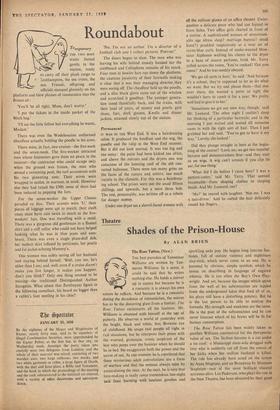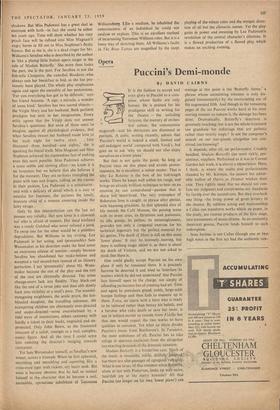Theatre
Shades of. the Prison-House
By ALAN BRIEN The Rose Tattoo. (New.) THE best parodies of Tennessee Williams are written by Ten-
)could be said that he writes nessee Williams. In a sense, it
nothing else. He holds a mirror up to nature but because he is a romantic it is always his own nature he reflects. And because he is a romantic during the decadence of romanticism, the mirror has to be the distorting glass from a funfair. The Rose Tattoo caricatures all his features. Mr. Williams is obsessed with himself at the age of puberty. He observes a world of yesterday with the bright, black and white, box Brownie eye of childhood. He snaps real people all right in real situations, but he interprets their poses with the worried, grotesque, comic suspicion of the boy who peeps over the banister when he should be in bed. He exaggerates both the power and the terror of sex. At one moment he is convinced that these mysterious adult convolutions are a form of warfare and that the woman always wins by emasculating the man. At the next, he is sure that love-making is really some tremendous late-night tuck feast bursting with luscious goodies and sparkling soda pop. He begins long interior fan- tasies, full of outsize violence and nightmare slap-stick, which never come to an end. He is haunted by obvious, simple symbols which he insists on describing in language of sugared whimsy. He is too often the Boy's Own Play- wright. And yet, because the images which spout from the well of his subconscious are tapped from the underground lakes that feed all of us, his plays still have a disturbing potency. But he is the last person to be able to analyse the formula. His strength and weakness are the same. He is the poet of the subconscious and he can never forecast which of his brews will be fit for human consumption.
The Rose Tattoo has been widely taken as another Williams commercial for the therapeutic value of sex. The Sicilian heroine is a cat under a tin roof : a Mississippi slum-wife drugged with love who is suddenly cut off from the source of her kicks when her stallion husband is killed. The role has already been acted on the screen by Anna Magnani, and on Broadway by Maureen Stapleton—two of the most brilliant visceral actresses alive. Lea Padovani, who plays the role at the New Theatre, has been obscured by their giant
shadows. But Miss Padovani has a great deal in common with both—in fact she could be either ten years ago. Time will show whether her rosy peach face will be refined into Miss Magnani's angry'heron or fill out to Miss Stapleton's fleshy lioness. But as she is, she is a dead ringer for Mr. Williams's Serafina who is described by the author as 'like a plump little Italian opera singer in the role of Madam Butterfly.' She more than looks the part, she is the part. For Serafina is not the fish-wife Cleopatra, the cannibal Boadicea who always eats her breakfast in bed, as she has pre- viously been played. The whole play emphasises again and again the unreality of her pretensions. `For you everything has got to be different.' says her friend Assunta. 'A sign, a miracle, a wonder of some kind.' Serafina has two sacred objects— the Virgin Mary and her husband. Both perform prodigies but only in her imagination. Every critic agrees that the Virgin does not answer Serafina's questions. But most of them seem" to imagine, against all physiological evidence, that when Serafina swears her husband made love to her 'each night for twelve years . . . four thousand—three hundred—and eighty,' she is speaking the literal truth. Miss Magnani and Miss Stapleton achieved the tremendous feat of making even this seem possible. Miss Padovani achieves a more subtle and moving effect—we know it is an invention but we believe that she believes it for the moment. They are tachistes trampling the paint with toes and fingers, rolling on the canvas in their pasSion. Lea Padovani is a miniaturist : and with a delicacy of detail which it is easy to mistake for fussiness, she pictures the lonely, insecure child of a woman cowering inside the lusty virago.
Only by this interpretation can the last act possess any validity. Her new lover is a clownish oaf who is afraid of women. Her dead husband was a randy Galahad who never refused a joust. To swop one for the other would be a pointless degradation. But Williams in .his writing, Lea Padovani in her acting, and (presumably) Sam Wanamaker in his direction make the final scene an enormous release of tension—simply because Serafina has abandoned her make-believe and accepted a real second-best instead of an illusory perfection. I say 'presumably' about Mr. Wana- maker because the rest of the play and the rest of the cast are abysmally directed. The scene change-overs lack any fluidity. They black-out like the end of a revue joke and then ebb slowly back into visibility at a snail's pace. The scandal- mongering neighbours, the senile priest, the hot- blooded daughter, the travelling salesman, the scampering children are alternately' over-directed and under-directed—some overwhelmed by a tidal wave of *mannerisms, others castaway with hardly a talent to their backs, unguided and un- protected. Only John Bown, as the frustrated innocent of a sailor, emerges as a real, complex, comic figure. And all the time I could sense him resisting• the director's nudging towards caricature.
Yet Sam Wanamaker himself, as Serafina's new wooer, scores a triumph. When he first appeared, stumbling and mumbling and squinting like a cross-eyed tiger with rickets, my heart sank. But soon it became obvious that he had so soaked himself in the character that he became a real, incredible, uproarious inhabitant of Tennessee
Williamsburg. Like a medium, he inhabited the consciousness of an individual he could not analyse or explain. This is an excellent method of incarnating Tennessee Williams roles. But it is a lousy way of directing them. All Williams's faults in The Rose Tattoo are magnified by the inept
playing of the minor roles and the myopic direc- tion of all but the climactic. scenes. Yet the play gains in power and meaning by Lea Padovani's revelation of the central character's dilemma. It is a flawed production of a flawed play which makes an exciting evening.











































 Previous page
Previous page